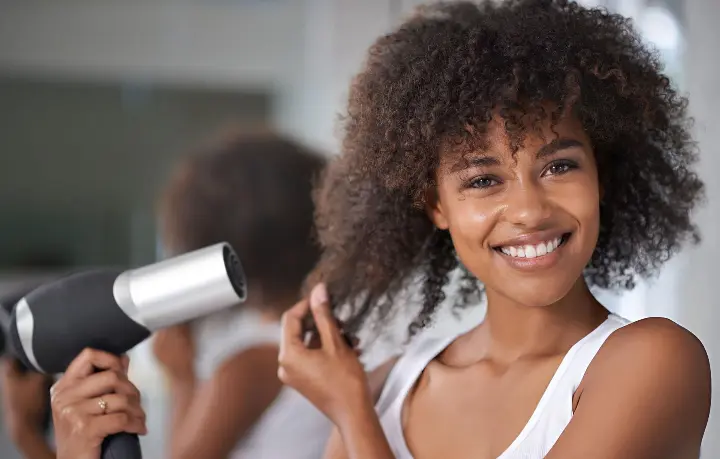Stress is an unavoidable part of life, affecting our physical and mental well-being in numerous ways. One often overlooked aspect of stress is its impact on hair health. From hair loss to lackluster strands, stress can wreak havoc on our tresses. This article will explore the connection between stress and hair health and offer strategies to manage stress for healthier hair.
Understanding the Connection Between Stress and Hair Health
Stress impacts the body in intricate and multifaceted ways, and hair is no exception. Elevated stress levels can interfere with the natural hair growth cycle, leading to a condition known as telogen effluvium. In this state, hair prematurely enters the resting phase and subsequently falls out. This condition can be especially noticeable for individuals with kinky curly hair, as the tight curl pattern can make hair thinning and loss appear more pronounced.
Moreover, stress doesn't just stop at hair loss; it can also worsen scalp conditions like dandruff and psoriasis. These issues can further compromise hair health, leading to an unhealthy scalp environment. The combination of disrupted hair growth and aggravated scalp conditions creates a perfect storm for hair problems, making stress management an essential aspect of maintaining healthy hair.
Strategies to Manage Stress for Better Hair Health
Managing stress is crucial for maintaining healthy hair. Here are some effective strategies:
1. Mindfulness and Meditation
Practicing mindfulness and meditation can significantly reduce stress levels. Mindfulness involves staying present in the moment and can help you manage stress more effectively. Meditation, on the other hand, promotes relaxation and reduces cortisol levels, which can positively impact hair health.
2. Physical Activity
Engaging in regular physical activity is one of the most effective strategies for managing stress. When you exercise, your body reduces the production of stress hormones like cortisol and adrenaline, helping you feel more relaxed and at ease. Additionally, physical activity stimulates the release of endorphins, often referred to as the body's natural mood lifters, which further alleviates stress and enhances your overall sense of well-being.
Beyond its stress-reducing benefits, exercise also promotes improved blood circulation throughout the body, including the scalp. Better blood flow ensures that hair follicles receive the necessary nutrients and oxygen, supporting healthy hair growth. Whether you prefer the calming effects of yoga, the invigorating pace of jogging, or simply enjoy a brisk walk, incorporating these activities into your routine can significantly contribute to both your mental health and hair health.
3. Healthy Diet
Maintaining a healthy head of hair starts with a balanced diet rich in essential vitamins and minerals. Nutrients like omega-3 fatty acids, biotin, and vitamins A, C, and E play crucial roles in promoting hair growth and strengthening hair strands. Foods such as fatty fish, eggs, spinach, and sweet potatoes are excellent sources of these nutrients and can help support healthy hair from within.
Additionally, incorporating stress-busting foods into your diet can benefit both your overall well-being and your hair health. Nuts, seeds, and leafy greens are not only packed with vital nutrients but also help reduce stress levels, which can otherwise contribute to hair thinning and loss. By ensuring a nutrient-rich diet and managing stress through wholesome foods, you can maintain strong, vibrant hair and overall health.
4. Adequate Sleep
Getting quality sleep is essential for reducing stress and maintaining overall health, including the health of your hair. When you consistently get 7-9 hours of uninterrupted sleep each night, your body has the opportunity to repair and rejuvenate itself. During these hours of rest, vital processes occur, such as the release of growth hormones that aid in cell repair and the reduction of stress hormones that can otherwise have a detrimental effect on your health.
On the flip side, poor sleep can significantly elevate your stress levels, which can negatively impact your hair growth and texture. When your body is stressed, it produces more cortisol, a hormone that can interfere with the hair growth cycle, potentially leading to hair thinning and loss. Moreover, inadequate sleep can disrupt the balance of nutrients your hair follicles need to stay strong and healthy, resulting in brittle, lackluster hair. Therefore, prioritizing good sleep hygiene is crucial for both your overall well-being and the vitality of your hair.
5. Scalp Care
Taking care of your scalp is essential for maintaining healthy hair. One of the best ways to promote scalp health is through regular scalp massages. These massages can significantly improve blood circulation, ensuring that your hair follicles receive the necessary nutrients and oxygen. Additionally, scalp massages help reduce stress, which is often a hidden factor in hair health problems. Stress can lead to hair thinning and loss, so incorporating scalp massages into your routine can address this issue directly.
To enhance the benefits of scalp massages, consider using essential oils like lavender or peppermint. These oils not only provide a pleasant aroma that promotes relaxation but also offer unique benefits for your scalp and hair follicles. Lavender oil is known for its calming properties and can help soothe an irritated scalp, while peppermint oil has a cooling effect that can stimulate hair growth and reduce dandruff. By integrating these essential oils into your scalp massage routine, you can create a more holistic approach to scalp and hair care, leading to stronger, healthier hair over time.
Incorporating Natural Hair Clip Ins

For those looking to enhance their hair while managing stress, Natural Hair Clip-Ins can be an excellent solution. These extensions can provide the appearance of fuller, thicker hair without the commitment of permanent extensions. They are particularly beneficial during periods of stress when hair may be thinning or shedding more than usual. Natural hair clip ins are easy to use and blend seamlessly with your hair, giving you an instant confidence boost while you work on managing your stress.
Expert Advice on Managing Stress for Hair Health
Experts agree that managing stress is essential for maintaining healthy hair. Dr. Lisa Johnson, a dermatologist specializing in hair health, notes, "Chronic stress can lead to significant hair issues. Incorporating stress management techniques into your daily routine can help maintain hair health and prevent stress-related hair problems."
Trichologist Sarah Blake adds, "In addition to managing stress, it's important to use gentle hair care products and avoid harsh treatments. Stress can make hair more susceptible to damage, so treating it with care is crucial."
Conclusion
Stress is an inevitable part of life, but its impact on hair health should not be underestimated. By understanding the connection between stress and hair health, you can take proactive steps to manage stress and promote healthier hair. From mindfulness and exercise to a balanced diet and quality sleep, there are numerous strategies to help you combat stress. Additionally, incorporating natural hair clip ins can provide a temporary solution for thinning hair, giving you the confidence to focus on your overall well-being.
Remember, taking care of your mental health is just as important as taking care of your hair. By managing stress effectively, you can achieve healthier, more vibrant hair and improve your overall quality of life.


